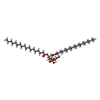+ Open data
Open data
- Basic information
Basic information
| Entry | Database: PDB / ID: 7m4q | |||||||||
|---|---|---|---|---|---|---|---|---|---|---|
| Title | Multidrug Efflux pump AdeJ | |||||||||
 Components Components | Efflux pump membrane transporter | |||||||||
 Keywords Keywords | MEMBRANE PROTEIN / multidrug efflux pump | |||||||||
| Function / homology |  Function and homology information Function and homology informationefflux transmembrane transporter activity / xenobiotic transmembrane transporter activity / response to toxic substance / plasma membrane Similarity search - Function | |||||||||
| Biological species |  Acinetobacter baumannii (bacteria) Acinetobacter baumannii (bacteria) | |||||||||
| Method | ELECTRON MICROSCOPY / single particle reconstruction / cryo EM / Resolution: 2.87 Å | |||||||||
 Authors Authors | Zhang, Z. | |||||||||
| Funding support |  United States, 1items United States, 1items
| |||||||||
 Citation Citation |  Journal: mBio / Year: 2021 Journal: mBio / Year: 2021Title: Cryo-EM Determination of Eravacycline-Bound Structures of the Ribosome and the Multidrug Efflux Pump AdeJ of Acinetobacter baumannii. Authors: Zhemin Zhang / Christopher E Morgan / Robert A Bonomo / Edward W Yu /  Abstract: Antibiotic-resistant strains of the Gram-negative pathogen Acinetobacter baumannii have emerged as a significant global health threat. One successful therapeutic option to treat bacterial infections ...Antibiotic-resistant strains of the Gram-negative pathogen Acinetobacter baumannii have emerged as a significant global health threat. One successful therapeutic option to treat bacterial infections has been to target the bacterial ribosome. However, in many cases, multidrug efflux pumps within the bacterium recognize and extrude these clinically important antibiotics designed to inhibit the protein synthesis function of the bacterial ribosome. Thus, multidrug efflux within A. baumannii and other highly drug-resistant strains is a major cause of failure of drug-based treatments of infectious diseases. We here report the first structures of the cinetobacter rug fflux (Ade)J pump in the presence of the antibiotic eravacycline, using single-particle cryo-electron microscopy (cryo-EM). We also describe cryo-EM structures of the eravacycline-bound forms of the A. baumannii ribosome, including the 70S, 50S, and 30S forms. Our data indicate that the AdeJ pump primarily uses hydrophobic interactions to bind eravacycline, while the 70S ribosome utilizes electrostatic interactions to bind this drug. Our work here highlights how an antibiotic can bind multiple bacterial targets through different mechanisms and potentially enables drug optimization by taking advantage of these different modes of ligand binding. Acinetobacter baumannii has developed into a highly antibiotic-resistant Gram-negative pathogen. The prevalent AdeJ multidrug efflux pump mediates resistance to different classes of antibiotics known to inhibit the function of the 70S ribosome. Here, we report the first structures of the A. baumannii AdeJ pump, both in the absence and presence of eravacycline. We also describe structures of the A. baumannii ribosome bound by this antibiotic. Our results indicate that AdeJ and the ribosome use very distinct binding modes for drug recognition. Our work will ultimately enable structure-based drug discovery to combat antibiotic-resistant A. baumannii infection. | |||||||||
| History |
|
- Structure visualization
Structure visualization
| Movie |
 Movie viewer Movie viewer |
|---|---|
| Structure viewer | Molecule:  Molmil Molmil Jmol/JSmol Jmol/JSmol |
- Downloads & links
Downloads & links
- Download
Download
| PDBx/mmCIF format |  7m4q.cif.gz 7m4q.cif.gz | 1013.1 KB | Display |  PDBx/mmCIF format PDBx/mmCIF format |
|---|---|---|---|---|
| PDB format |  pdb7m4q.ent.gz pdb7m4q.ent.gz | 840.2 KB | Display |  PDB format PDB format |
| PDBx/mmJSON format |  7m4q.json.gz 7m4q.json.gz | Tree view |  PDBx/mmJSON format PDBx/mmJSON format | |
| Others |  Other downloads Other downloads |
-Validation report
| Arichive directory |  https://data.pdbj.org/pub/pdb/validation_reports/m4/7m4q https://data.pdbj.org/pub/pdb/validation_reports/m4/7m4q ftp://data.pdbj.org/pub/pdb/validation_reports/m4/7m4q ftp://data.pdbj.org/pub/pdb/validation_reports/m4/7m4q | HTTPS FTP |
|---|
-Related structure data
| Related structure data |  23664MC  7m4pC  7m4uC  7m4vC  7m4wC  7m4xC  7m4yC  7m4zC M: map data used to model this data C: citing same article ( |
|---|---|
| Similar structure data |
- Links
Links
- Assembly
Assembly
| Deposited unit | 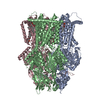
|
|---|---|
| 1 |
|
- Components
Components
| #1: Protein | Mass: 114637.781 Da / Num. of mol.: 3 Source method: isolated from a genetically manipulated source Source: (gene. exp.)  Acinetobacter baumannii (bacteria) / Gene: adeJ, mexB_1, mexB_2 / Production host: Acinetobacter baumannii (bacteria) / Gene: adeJ, mexB_1, mexB_2 / Production host:  #2: Chemical | ChemComp-3PE / Has ligand of interest | N | |
|---|
-Experimental details
-Experiment
| Experiment | Method: ELECTRON MICROSCOPY |
|---|---|
| EM experiment | Aggregation state: PARTICLE / 3D reconstruction method: single particle reconstruction |
- Sample preparation
Sample preparation
| Component | Name: multidrug efflux pump AdeJ / Type: COMPLEX / Entity ID: #1 / Source: RECOMBINANT |
|---|---|
| Molecular weight | Experimental value: NO |
| Source (natural) | Organism:  Acinetobacter baumannii (bacteria) Acinetobacter baumannii (bacteria) |
| Source (recombinant) | Organism:  |
| Buffer solution | pH: 7.5 |
| Specimen | Embedding applied: NO / Shadowing applied: NO / Staining applied: NO / Vitrification applied: YES |
| Vitrification | Cryogen name: ETHANE |
- Electron microscopy imaging
Electron microscopy imaging
| Experimental equipment |  Model: Titan Krios / Image courtesy: FEI Company |
|---|---|
| Microscopy | Model: FEI TITAN KRIOS |
| Electron gun | Electron source:  FIELD EMISSION GUN / Accelerating voltage: 300 kV / Illumination mode: FLOOD BEAM FIELD EMISSION GUN / Accelerating voltage: 300 kV / Illumination mode: FLOOD BEAM |
| Electron lens | Mode: BRIGHT FIELD |
| Image recording | Electron dose: 36 e/Å2 / Film or detector model: GATAN K3 BIOQUANTUM (6k x 4k) |
- Processing
Processing
| Software |
| ||||||||||||||||||||||||
|---|---|---|---|---|---|---|---|---|---|---|---|---|---|---|---|---|---|---|---|---|---|---|---|---|---|
| CTF correction | Type: PHASE FLIPPING AND AMPLITUDE CORRECTION | ||||||||||||||||||||||||
| 3D reconstruction | Resolution: 2.87 Å / Resolution method: FSC 0.143 CUT-OFF / Num. of particles: 83768 / Symmetry type: POINT | ||||||||||||||||||||||||
| Refinement | Cross valid method: NONE Stereochemistry target values: GeoStd + Monomer Library + CDL v1.2 | ||||||||||||||||||||||||
| Displacement parameters | Biso mean: 57.84 Å2 | ||||||||||||||||||||||||
| Refine LS restraints |
|
 Movie
Movie Controller
Controller










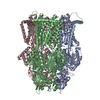
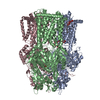
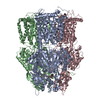
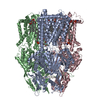
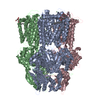
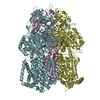
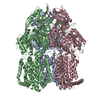

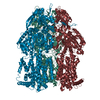
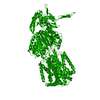
 PDBj
PDBj
